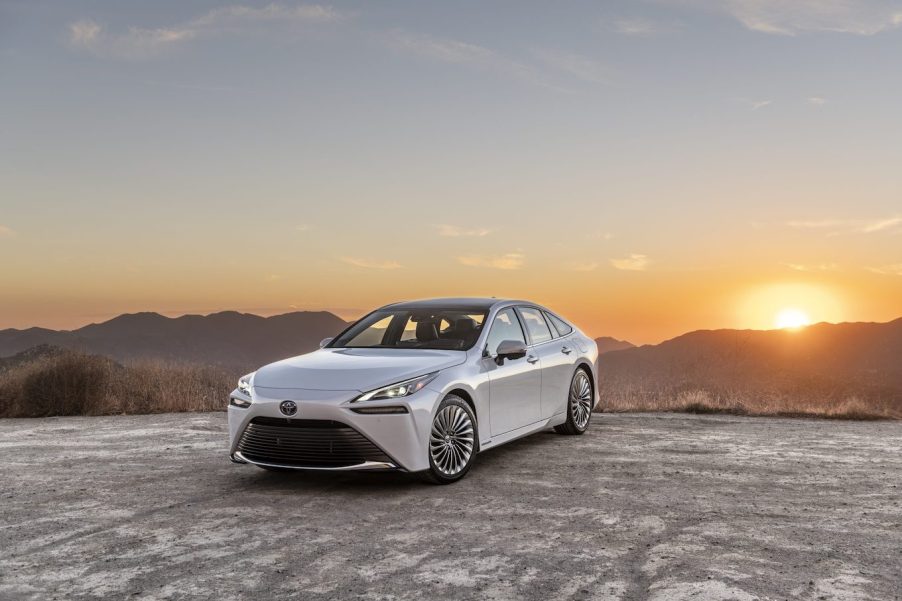
Toyota Gives Up on Hydrogen Cars…For Now
In this article:
For those who hate the idea of a silent driving future, hydrogen cars are a beacon of hope. No brand embraced the potential of hydrogen-powered cars quite like Toyota. But now, it seems the brand behind the futuristic Mirai hydrogen car is letting go of its alternative in favor of battery electric power.
The Toyota Mirai is Toyota’s most successful failure
The Toyota Mirai is Toyota’s only hydrogen vehicle available to the public. It began selling in 2015, where it sold 72 models. From there, the Mirai generally trended upward, selling between 1,500 and 1,800 models from 2017 to 2019. After a big sales dip in 2020, GoodCarBadCar data shows the Mirai came roaring back with 2,629 sales in 2021, another 2,000 in 2022, and over 2,660 so far in 2023.
Importantly, the Mirai is only available for sale in California and New Jersey. That’s because hydrogen charging stations are only available in those states. Overall then, the Mirai is a fairly successful concept to show off Toyota’s hydrogen capability. However, the brand could never translate the Mirai’s function into infrastructure investments. That meant the Mirai remained market-limited to just two U.S. states.
Toyota Mirai Sales Year-By-Year
| Year | Units Sold |
|---|---|
| 2015 | 72 |
| 2016 | 1,034 |
| 2017 | 1,838 |
| 2018 | 1,689 |
| 2019 | 1,502 |
| 2020 | 499 |
| 2021 | 2,629 |
| 2022 | 2,094 |
| 2023 | 2,661* |
Toyota exec says hydrogen cars are “not successful”

While the technology works and the Mirai is, in large part, a useful vehicle, Toyota execs at the Tokyo Mobility Show expressed regrets that the Mirai never went mainstream. In speaking to Andrew English from The Intercooler, Toyota’s Chief Technical Officer, Hiroka Nakajima, said, “‘We have already tried with the Mirai, but unfortunately it has not been successful because of the hydrogen filling station point of view, there are few.”
However, he intimated that Toyota would continue developing hydrogen vehicle technology for commercial vehicles. In part, Nakajima stated, “So we have changed our strategy from passenger cars to commercials.”
Hydrogen cars have a bigger infrastructure problem than EVs
All of the pushback regarding battery electric vehicles involves range and recharging stations. But hydrogen cars face a similar, albeit much larger issue. Despite Japan’s mandate for a hydrogen car future, it couldn’t build enough hydrogen filling stations to make individual Hydrogen vehicle ownership a functional reality.
That lack of infrastructure has Toyota turning the page on its hydrogen tech. Now, the battery-free EV tech is aimed at commercial trucks, buses, trains, and boats rather than consumer cars. For Toyota’s consumer vehicles, the company is looking at accelerating the development of traditional battery EVs instead.
Toyota will continue developing hydrogen tech via racing

All of this isn’t to say that Toyota is giving up on hydrogen cars forever. In addition to its commercial pursuits, Toyota’s Gazoo Racing division continues working with both hydrogen and e-fuels. Overall, the brand’s goal of a CO2-emissions-free future remains, but it’s taking a more pragmatic approach to how it deploys hydrogen tech until the science and infrastructure catch up. For now, though, it seems like our driving future involves batteries.




